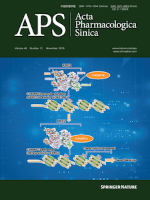
ACTA PHARMACOLOGICA SINICA
Scope & Guideline
Pioneering Insights in Medical Pharmacology
Introduction
Aims and Scopes
- Pharmacodynamics and Pharmacokinetics:
Research on the mechanisms of drug action, including absorption, distribution, metabolism, and excretion of drugs, to understand their therapeutic effects and side effects. - Molecular Pharmacology:
Investigations into the molecular mechanisms underlying drug interactions with biological systems, contributing to the identification of new drug targets. - Translational Medicine:
Studies that bridge the gap between laboratory research and clinical application, focusing on how laboratory findings can inform clinical practice and improve patient outcomes. - Neuropharmacology:
Research dedicated to understanding how drugs affect the nervous system, including studies on neurodegenerative diseases, pain management, and psychiatric disorders. - Natural Products and Traditional Medicines:
Exploration of pharmacological properties of natural compounds and traditional medicines, including their potential therapeutic applications and mechanisms of action. - Cancer Pharmacology:
Research focused on the mechanisms of action of anti-cancer agents, drug resistance, and the development of novel therapeutic strategies for cancer treatment. - Immunopharmacology:
Studies examining the interplay between pharmacological agents and the immune system, including the development of immunotherapies for various diseases.
Trending and Emerging
- Ferroptosis and Cell Death Mechanisms:
Research focusing on ferroptosis, a form of regulated cell death, has surged, particularly in relation to cancer treatment and neurodegenerative disease mechanisms. - Microbiome and Drug Interactions:
Studies exploring the relationship between gut microbiota and drug metabolism or therapeutic effects are increasingly prominent, highlighting the importance of microbiome research in pharmacology. - Targeted and Personalized Medicine:
There is a growing emphasis on targeted therapies and personalized medicine approaches, particularly in oncology, reflecting advances in understanding individual patient responses to treatment. - Nanomedicine and Drug Delivery Systems:
Innovative drug delivery systems utilizing nanotechnology are gaining attention, particularly for their potential to enhance therapeutic efficacy and reduce side effects. - Immunotherapy Approaches:
Research into immunotherapeutic strategies, especially for cancer treatment, is on the rise, reflecting the success of immune checkpoint inhibitors and CAR-T cell therapies. - Biomarker Discovery and Application:
The identification and application of biomarkers for predicting drug response and disease progression are trending, emphasizing the integration of biomarkers in clinical pharmacology. - Neuroinflammation and CNS Disorders:
Increased research on neuroinflammation and its role in central nervous system disorders is emerging, particularly in the context of developing new therapeutic strategies.
Declining or Waning
- Basic Pharmacological Studies:
There has been a noticeable decline in purely basic pharmacological studies that do not translate to clinical relevance, as researchers increasingly prioritize translational and applied research. - Pharmacogenetics:
While pharmacogenetics remains important, the frequency of studies specifically targeting genetic determinants of drug response has decreased, possibly due to the rising focus on broader systems biology approaches. - Drug Development Process:
Research specifically detailing the early drug development phases has seen reduced coverage, as more studies focus on late-stage clinical trials and real-world applications. - Toxicology Studies:
Studies solely focused on the toxicological aspects of drugs without a clear therapeutic angle are less frequently published, reflecting a shift towards understanding therapeutic windows and drug safety in clinical contexts.
Similar Journals

Drug Design Development and Therapy
Unlocking New Horizons in Drug Development and TherapyDrug Design Development and Therapy is a premier open-access journal published by DOVE MEDICAL PRESS LTD, dedicated to advancing the fields of drug discovery, pharmaceutical science, and pharmacology. With an impressive Q1 ranking in its categories as of 2023, this journal is recognized for its significant contributions to the understanding of drug design and therapeutic innovations, making it an invaluable resource for researchers, professionals, and students alike. Established in 2007 and committed to open-access since 2008, the journal provides an inclusive platform for disseminating high-quality research from around the globe. With a robust impact factor and remarkable Scopus rankings, including a 24th place in Pharmaceutical Science and a 48th place in Pharmacology, it reflects a strong percentile performance, ensuring that published articles reach and impact a wide audience. By fostering the exchange of cutting-edge information on drug development and delivery systems, Drug Design Development and Therapy continues to play a crucial role in the ongoing battle against disease, promoting innovative approaches to therapeutic solutions and enhancing patient care.
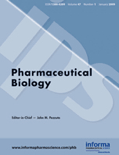
PHARMACEUTICAL BIOLOGY
Bridging the Gap Between Biology and Pharmaceutical ApplicationsPHARMACEUTICAL BIOLOGY, published by Taylor & Francis Ltd, is a prominent open-access journal that has been a cornerstone of research in the life sciences since its convergence in 1961. With a strong focus on Complementary and Alternative Medicine, Pharmaceutical Science, and Drug Discovery, this journal is dedicated to disseminating groundbreaking research that intersects pharmaceuticals and biology. Acknowledged for its rigorous peer-review process, it holds a prestigious Q1 ranking in Pharmaceutical Science and exemplifies the commitment to quality and impact in the field, boasting an impressive Scopus rank of #14/105 in the complementary and alternative medicine category. Researchers keen on advancing their knowledge in these fields will find PHARMACEUTICAL BIOLOGY an invaluable resource, offering accessibility since its shift to open access in 2017. This journal presents a platform for innovative studies that contribute to the evolving understanding of pharmaceutical applications and biological interactions, serving as an essential hub for researchers, professionals, and students alike.
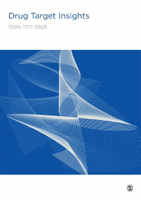
Drug Target Insights
Unveiling Innovations in Therapeutic Targeting.Drug Target Insights is a prestigious peer-reviewed journal published by ABOUTSCIENCE SRL, catering to the dynamic field of pharmacology and medicinal biochemistry. With an Open Access policy since 2006, the journal aims to promote the dissemination of cutting-edge research and innovations that target drug discovery and therapeutic developments. Based in Milan, Italy, it boasts a notable impact within its research community, achieving a Q3 classification in the categories of Clinical Biochemistry and Medical Pharmacology in 2023, alongside a robust performance in the Q2 category for Pharmacology, Toxicology, and Pharmaceutics. The journal serves as a vital platform for researchers, professionals, and students seeking to advance their understanding of drug delivery systems, therapeutic targets, and pharmacodynamics. With a commitment to enhancing global access to crucial research findings, Drug Target Insights stands out as an essential resource for those engaged in the ever-evolving landscape of pharmaceutical sciences.
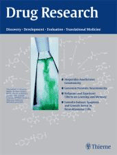
Drug Research
Empowering Researchers in the Quest for InnovationDrug Research, published by GEORG THIEME VERLAG KG, is a pivotal journal housed in the vibrant realm of pharmacology and drug discovery. With a commitment to advancing the understanding of medicinal substances, this journal serves as an essential resource for researchers, professionals, and students dedicated to the field. The journal boasts an ISSN of 2194-9379 and an E-ISSN of 2194-9387, reflecting its dual commitment to print and digital accessibility. Despite its status as a Q3 journal in both Drug Discovery and Miscellaneous Medicine categories as of 2023, it continues to offer valuable insights with a focus on the latest innovations, methodologies, and findings in drug research. Based in Germany, Drug Research promotes scholarly communication and collaboration within the scientific community, ensuring that its contributions remain impactful in shaping future therapeutic discoveries. The journal is indexed in relevant databases, enhancing its visibility and reach, thus fostering a robust academic dialogue.

CHEMICO-BIOLOGICAL INTERACTIONS
Fostering Breakthroughs in Toxicology and MedicineCHEMICO-BIOLOGICAL INTERACTIONS is a premier journal published by Elsevier Ireland Ltd, dedicated to advancing the field of chemical and biological interactions since its inception in 1969. With a robust focus on pharmacology and toxicology, the journal holds a prestigious Q1 ranking in both Medicine (miscellaneous) and Toxicology, reflecting its significance in disseminating influential research. As part of the Scopus database, it ranks #21 out of 133 journals in Toxicology, positioning it in the 84th percentile and ensuring high visibility for cutting-edge studies. This scholarly platform serves as a crucial resource for researchers, professionals, and students who seek reliable and innovative findings at the intersection of chemistry and biology. While currently not open access, CHEMICO-BIOLOGICAL INTERACTIONS provides a comprehensive collection of articles that contribute to the ongoing dialogue in toxin research and its implications on medicinal chemistry, thereby fostering advancements in public health and safety.
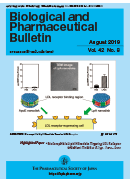
BIOLOGICAL & PHARMACEUTICAL BULLETIN
Connecting Research and Practice in PharmacologyBIOLOGICAL & PHARMACEUTICAL BULLETIN, published by the PHARMACEUTICAL SOC JAPAN, is a prominent peer-reviewed journal that serves the fields of medicine, pharmaceutical science, and pharmacology. With an ISSN of 0918-6158 and an E-ISSN of 1347-5215, this publication has been crucial in disseminating innovative research since its inception in 1993, and it continues to contribute significantly to the body of knowledge as it converges towards 2024. Despite being classified as a non-open access journal, it maintains a respectable Q3 ranking in Medicine (miscellaneous) and Q2 in Pharmaceutical Science, highlighting its critical role in advancing scientific discourse in these areas. With Scopus rankings placing it in the 51st percentile for Pharmaceutical Science and 38th percentile for Pharmacology, BIOLOGICAL & PHARMACEUTICAL BULLETIN is an essential resource for researchers, professionals, and students looking to stay abreast of cutting-edge developments and trends in biomedicine and drug development.
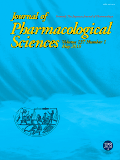
Journal of Pharmacological Sciences
Innovating drug development through impactful science.Journal of Pharmacological Sciences is a leading peer-reviewed academic journal dedicated to the field of pharmacology, published by the Japanese Pharmacological Society. Since its inception, this journal has offered an essential platform for the dissemination of high-quality research, contributing significantly to advancements in molecular medicine and pharmacology. With an impact factor that places it in the prestigious Q2 quartile for both categories, the journal has established itself as a credible source of innovative findings and methodologies since its transition to Open Access in 2015. This accessibility enables a broader audience, including researchers, healthcare professionals, and students, to engage with valuable insights and discussions pertinent to drug development, pharmacodynamics, and therapeutic strategies. Based in Kyoto, Japan, the journal serves as a vital resource for the global pharmacological community, encouraging collaboration and research that leads to improved health outcomes. For more information, submissions, and access to the latest research, visit the journal’s website.

NAUNYN-SCHMIEDEBERGS ARCHIVES OF PHARMACOLOGY
Illuminating the Complexities of Drug MechanismsNAUNYN-SCHMIEDEBERGS ARCHIVES OF PHARMACOLOGY is a prestigious journal published by SPRINGER, focusing on the dynamic fields of pharmacology and toxicology. With an ISSN of 0028-1298 and an E-ISSN of 1432-1912, this esteemed publication has been a staple in the scientific community since its inception in 1969, continuing to wield influence with a convergence of research that reaches through 2024. Ranked in the Q2 category for both medicine and pharmacology, it stands at an impressive 111th out of 313 in the Scopus rankings for pharmacology, reflecting its significant impact in the field. Though not offering open access, the journal remains a vital resource for researchers, professionals, and students seeking to explore groundbreaking studies and advancements in pharmacological science. With its high standards and comprehensive coverage, NAUNYN-SCHMIEDEBERGS ARCHIVES OF PHARMACOLOGY is essential reading for those dedicated to understanding the mechanisms of drug action and the complexities of therapeutic interventions.

MEDICINAL RESEARCH REVIEWS
Driving Excellence in Molecular Medicine ResearchMEDICINAL RESEARCH REVIEWS, published by Wiley, is a leading journal in the fields of Drug Discovery, Molecular Medicine, and Pharmacology. With an impressive impact factor and esteemed standing in its category quartiles (Q1 in all three fields), this journal serves as a vital platform for the dissemination of cutting-edge research and reviews that drive innovation in therapeutic development and molecular health sciences. Since its inception in 1981, MEDICINAL RESEARCH REVIEWS has garnered a robust readership within the scientific community, underscored by its high rankings in Scopus – where it ranks #3 in Pharmacology and #2 in Drug Discovery, placing it within the top echelons of academic influence. Researchers, professionals, and students alike benefit from its rich content and comprehensive approaches to tackling complex medicinal challenges, making it an essential resource for those invested in advancing the frontiers of biomedical research.
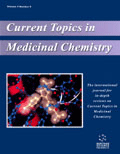
CURRENT TOPICS IN MEDICINAL CHEMISTRY
Leading the Way in Medicinal Chemistry ResearchCURRENT TOPICS IN MEDICINAL CHEMISTRY is a prestigious journal published by Bentham Science Publishers Ltd, dedicated to advancing the field of medicinal chemistry through the dissemination of high-quality research from 2001 to 2024. With an ISSN of 1568-0266 and an E-ISSN of 1873-4294, this journal is recognized for its significant contributions, as evidenced by its Scopus ranking in the 63rd percentile in the category of Drug Discovery, specifically at position #58 out of 157. Currently placed in Quartile 3 within Drug Discovery and Quartile 2 in miscellaneous medicine as of 2023, it serves as an essential resource for researchers, professionals, and students interested in the latest developments, methodologies, and applications in medicinal chemistry. The journal aims to foster collaboration and innovation by featuring original research articles, reviews, and brief communications that address current and emerging challenges in the discipline. Although it is not an open access platform, the journal's rich content is indispensable for those striving to enhance therapeutic strategies and drug development processes.